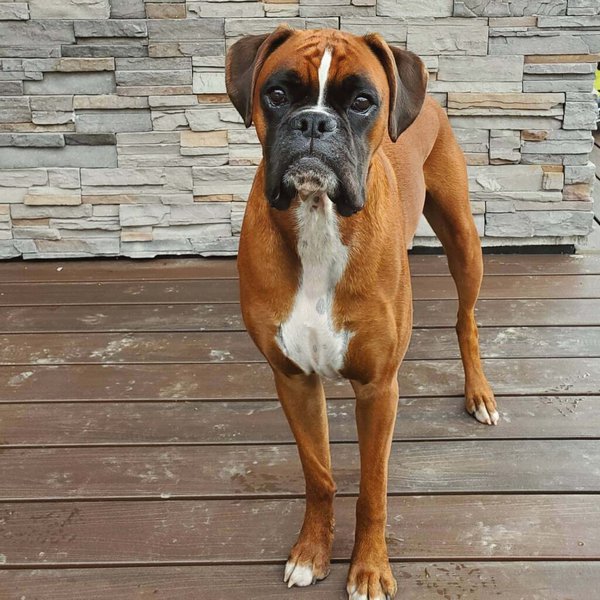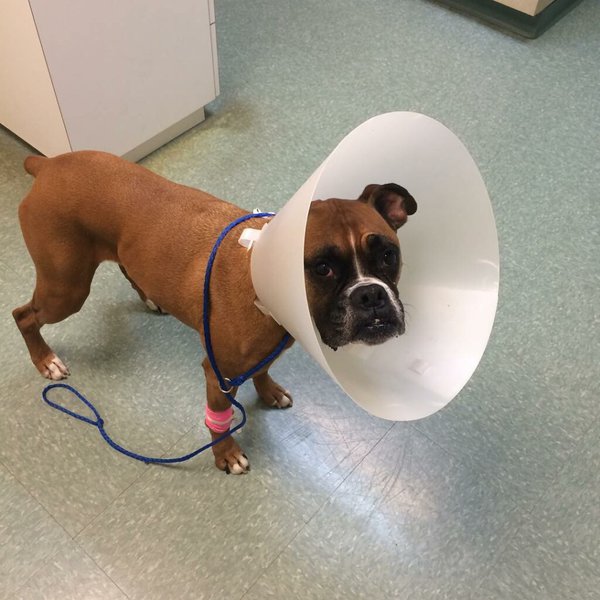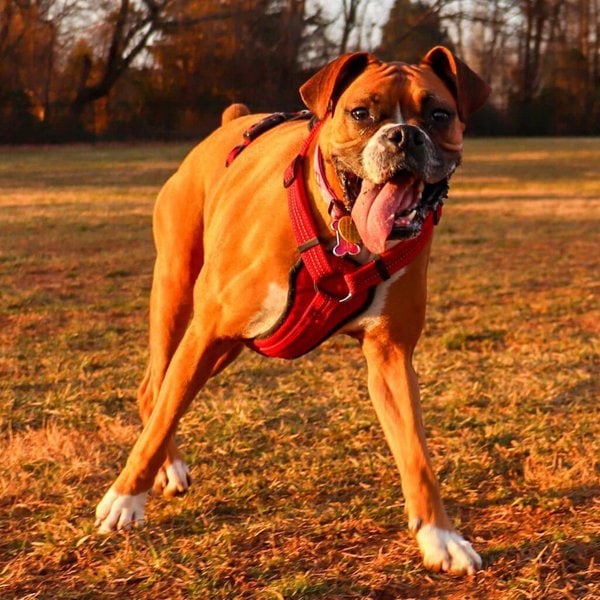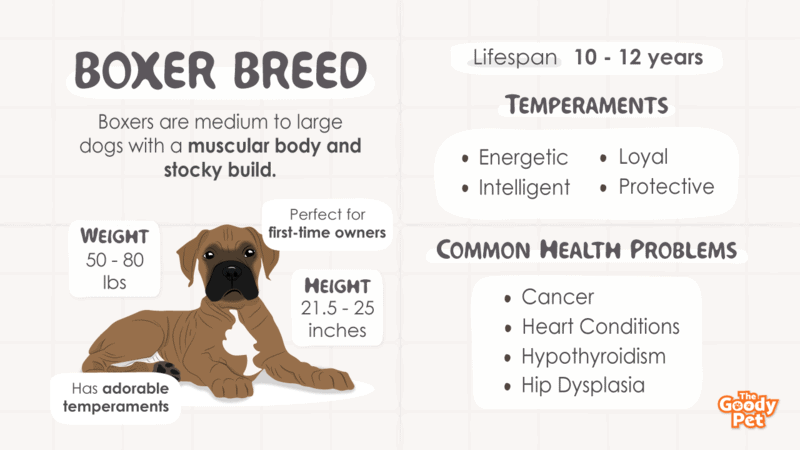Why should you choose to own a Boxer dog? I have prepared this complete Boxer breed guide to answer similar questions. It should cover everything you need to befriend and care for a Boxer. So, here’s the lowdown on this dog breed.
A Boxer dog is a medium to large dog with a short-haired, smooth coat that lies tightly to its body. This pooch commonly comes in fawn or brindle colors but with white markings typically on its chest, and has adorable temperaments that make the Boxer dog breed a great family dog.
In this guide, we cover the life expectancy of Boxers, common illnesses, and their odor. We also share shedding and grooming advice for your canine and the tools needed for both. As usual, I’ll reveal our take on how Boxers fit in with the family, and review their temperaments and need for companionship. You’ll also learn what entails a comfortable home for your doggie. Before then, let’s look at whether Boxer dogs are bullies.
Is A Boxer A Bully Breed?
A Boxer dog is a bully dog breed. The Boxer breed ancestry and physical attributes trace back to the Molosser breed which had large muscular bodies bred for protection, routine daily work and companionship.
Is Boxer Good For First-Time Dog Owners?
First-time dog owners struggle with related responsibilities, particularly the need for security, comfort, and proper equipment in a short turnaround. Studies show that owning a doggie impacts your health, but your mental and emotional state is contagious and will show in your doggie’s mental health.
We advocate for first-time owners, choosing a fitting dog breed to complement their personality and lifestyle.
So, is a Boxer dog good for first-time owners? Yes, they are. Boxers have reduced grooming needs, are protective, and excel in active lifestyles given their high energy, making the dogs perfect for first-time owners.

How Big Do Boxer Breeds Get?
Boxers are medium to large dogs with a muscular body and stocky build. The males stand at 23 to 25 inches tall and weigh 65 to 80 lbs. Being marginally smaller, female Boxers grow between 21.5 and 23.5 inches tall, weighing from 50 to 65 lbs. On average, female Boxers are 15 lbs lighter than their male counterparts.
Physical Appearance
Your Boxer dog can be tan, brindle, or white with an undershot jaw, floppy ears, and blunt muzzle. Your pooch has a deep and broad chest, with a short and strong back reminiscent of other working dogs. Its tail is often docked and raised high.
How Long Do Boxer Breeds Live?
The average Boxer lifespan is 10 to 12 years. Poor health may cause premature death at 8 years old, however, while healthy doggies could live up to 13 to 15 years.
How Do Boxer Dogs Die?
A birth cohort study in 2005 found that 45% of Boxers die before reaching the age of 10, despite 88% reaching 5 years old. Hereditary conditions account for up to 76% of the deaths, with cancers responsible for about 44%. However, fatal pyogranulomatous myocarditis causes the most deaths below 5 years.
Other fatal diseases, including neurological conditions, trauma, and heart disorders, are managed medically or through safer environments. Old age is the second most common cause of death among Boxers.
Common health issues affecting your Boxer dog may include:
Cancer
Common cancers include brain tumors, lymphomas, and mast cell tumors. While skin cancer is prevalent in White Boxers and light-colored Boxers, you can protect your doggie through minimal sunlight.
Heart Conditions
These conditions are mostly congenital and include an obstructed aortic valve (stenosis) and cardiomyopathy, which restricts the heart’s ability to pump blood sufficiently. Stenosis can lead to sudden death, but early diagnosis allows the condition to be managed.

Hypothyroidism
Prevalent in middle-aged and older boxers, this condition causes continuous fatigue and lower activity levels, unlike the vibrant nature of healthy Boxers. Symptoms include loss of hair, weight loss, and depression, which can be relieved by medication.
Hip Dysplasia
A congenital condition due to early degenerative diseases your canine suffered early on, which can eventually cause loss of function in the hips. Medication and surgery are possible remedies.
Your Boxer will have a bad smell due to poor hygiene, a wet coat due to exposure to moisture, as well as a smelly anal gland.
How To Take Care Of Your Boxer?
Caring for your Boxer canine involves sufficient exercise, proper diet, training, vet visits, and a comfortable, secure home. Your doggie is sensitive to extreme temperatures and must be kept in the house with the family.
Also, schedule regular, short training sessions to enhance communication and form a stronger bond.
Exercise Routine
Boxers are active, high-energy dogs. This huge energy must be spent to avoid destruction and help with their sturdy, muscular build. We found that 2 daily sessions provided sufficient exercise for your pooch, depending on your companion’s size.
So, how far should you walk a Boxer dog? We recommend two 30-minute daily walks with your adult Boxer, but the occasional longer walk would equally benefit your healthy doggies too. Unguided exercises in a securely fenced area will allow your canine sufficient room for sniffing and exploring.
High-Quality Diet
Your Boxer needs about 2.5 to 3 cups of high-quality food served twice per day. The AAFCO nutrient requirements recommend at least 22% protein for growth and 18% in adults, with about 8% fat and 5% for puppies. Include multivitamins and other minerals in the diet for a wholesome and healthy nutrition.
Homemade meals should include breast chicken, turkey, fish, and vegetables, as well as a vitamin mix consisting of vitamins A, B6, B12, C, D3, and E. High-quality commercial foods like the Pet Plate’s high-protein and grain-free Barkin’ Beef recipe are already enriched with these key nutrients.
Having frequent wet food but without regular brushing may lead to rapid bacteria growth in the mouth of your Boxer dog. Use high-quality dental water additives to maintain good oral hygiene and to fight canine dental disorders.

Is A Boxer A Good Family Dog? Temperaments Of Boxer Breeds
Boxers make good family dogs. Your doggie is energetic, intelligent, active, and fearlessly loyal to the household while bearing natural protective instincts. They are also playful, sweet, and crave companionship, making Boxers a loving addition to the family.
So, are Boxers patient with children? Your doggie will be great around children, given proper training, but we advise against unmonitored interaction with younger children considering their huge size and vibrant nature.
As natural guard dogs, Boxers also bark regularly. You can control the amount and frequency of barking through behavioral and personality training and socialization such that your dear fido only barks to alert the household of sudden motions or unfamiliar persons.
Temperaments Of Boxer Breeds
The overarching Boxer temperaments include:
- Intelligent
- Loyal
- Playful
- Loving
- Protective
- Fearless

Is A Boxer An Aggressive Breed Dog?
Boxers are seldom aggressive, except when bored, have not exercised for long, or lack proper socialization training. High activity will keep your pooch calm, but boredom-based aggression leads to destruction while poor socialization instigates fear-based aggression, thereby posing a danger to strangers.
As such, it is recommended not to leave your Boxer dog alone for more than 3 to 4 hours. If there is a need to, you can look into hiring a professional sitter to accompany your pooch in your absence.
Boxers can also mirror a disagreeable owner and become aggressive through reflection. We recommend observing your doggie’s body language and halt any early signs of aggression.
An aggressive Boxer can attack and bite other dogs or strangers. So, how do you calm down an aggressive Boxer dog? Elimination and retraining are two key aspects to consider.
Firstly, identify the cause of aggression and break the circuit by taking your doggie out of the stressful condition, thereby eliminating the trigger. Lastly, you should look into retraining to help foster a better response to similar situations in the future.
Do Boxers Shed A Lot? Grooming Tips For Boxer Breeds
Because of the tight-fitting coat and short hairs, your Boxer does not shed a lot, thereby making your canine low-maintenance.
However, your pooch sheds throughout the year, with spikes during the spring and autumn. For this reason, Boxers are not hypoallergenic.
In addition, the single coat layer and short hairs mean your furry friend is exposed to overheating more than most dogs and may require a coat or vest to maintain core body temperature.
Grooming Tips For Boxer Breeds
You only require minimal grooming to keep your canine in peak condition. Brush once a week to remove any loose hairs, prevent matting, and spread natural coat oils. Use specialized tools, like the FURminator Undercoat Tool to remove excess hairs and control shedding.
Boxers also require monthly ear cleaning to avert ear problems as well as weekly cleaning to remove red yeast around the moist flaps and folds close to the eyes and nose.
Ensure you trim or file your doggie’s nails every two months to avoid scratching while using paw balm weekly ensures soft and pliable paw pads and reduces the likelihood of cracking.
Bathing
Your Boxer needs a regular but infrequent full bath to clean the coat, moisturize, and remove bad odor. Bath your doggie once every 3 weeks, with 2 baths each time the most ideal.
The first, a general bath, should use any high-quality care product like the Pro Pet Works All Natural 5 In 1 Oatmeal Shampoo, while the second should include vinegar and other odor removers.
Clean and dry the folds on facial skin to eliminate odors and avoid infections like the skin fold dermatitis.
Related Questions
How Much Should I Pay For A Boxer Puppy? The median price for a healthy Boxer puppy from high-quality breeders will cost about $1,000 to $2,000. However, Boxer puppies from reputable breeders with superior pedigrees and more, better-quality additional services cost between $3,000 and $4,500. We discourage buying a Boxer puppy under $500, because such a price range can only come from low-quality puppy mills or farms.
Are Boxers Good Off Leash? Boxer dogs are not good off-leash as they are likely to run off on their own, given their high curiosity level and energetic nature. Despite little instances of subtle stubbornness, a properly-trained Boxer responds well to positive reinforcement techniques, and will therefore be fine off the leash. We encourage advanced training in self-control and communication before taking your Boxer dog off the leash.
Why Do They Cut Off Boxers’ Tails? Initially, Boxer’s tail docking was practiced to prevent rabies, increase speed, and prevent physical injuries during hunting or herding activities. Today, docking is necessary to conform to the AKC’s breed standard which requires Boxer tails to be set high, carried upward, and docked so as to define and preserve the doggie’s character, especially for show ring dogs.





